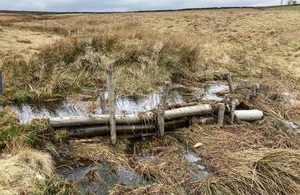Almost £5million investment brings boost to Yorkshire environment
Press release
More than 82 hectares of habitat has been created or improved in the past year as part of the Environment Agency’s programme of improvements across Yorkshire.

A leaky dam as part of the Sheffield Lakeland Landscape project
The programme, which includes almost 40 projects, also includes 15km of riverbank improvements and has seen 53,000 trees planted.
Projects include removing barriers to fish movement, habitat restoration, measures to improve water quality and natural flood management, which protect the natural environment, make rivers more resilient to climate change and boost wildlife.
The Yorkshire Environment Programme is managed and delivered by the Environment Agency working mainly in partnership with government-backed Catchment Partnerships, bringing together river and wildlife trusts, local authorities and other organisations to improve the environment.
There were over 100 partners involved in this year’s £5million programme contributing more than £2.1million in funding to the projects.
Key projects progressed in 2021/22 include:
- The Upper Aire Habitat and Land Management Project has improved habitat and water quality across over 350km² through landowner engagement.
- Connecting the Calder is investigating five potential weir removals on the River Calder.
- Derwent Upland Streams has been working with landowners in the North York Moors National Park and surrounding areas to improve land management and boost ecological status across eight waterbodies.
- The BEACH Esk project has worked with local communities and landowners to reduce marine pollution and increase habitats like saltmarsh in the Esk estuary.
- Other projects on the Esk include the ongoing Pearl Mussel captive breeding programme to drive the recovery of the endangered species, and research work to discover if invasive signal crayfish are present in the river.
- A new Yorkshire Coast Catchment Partnership was set up to bring together expertise to benefit the 320km Yorkshire coastline.
- Sheffield Lakeland Landscape Partnership has reduced the run-off of water from the land and sedimentation in the Don and Rother Catchment and slowed the flow – reducing flood risk downstream.
- The Leven Canal was de-silted delivering 1.6km of improvements to what is a Site of Special Scientific Interest (SSSI).
- The Rivers in Elmet project addressed sediment and nutrient pollution through tree and hedgerow planting and making improvements on farms.
Victoria Slingsby, Environment Planning and Engagement Manager for the Environment Agency in Yorkshire, said:
This year’s environment programme has yet again seen some significant improvements right across the county, from natural flood management solutions, improved fish migration and interventions to enhance water quality.
The scale of delivery and achievement reflects the appetite of ourselves and our partners in Yorkshire to be at the forefront of managing environmental improvements for people and wildlife.
Published 1 September 2022